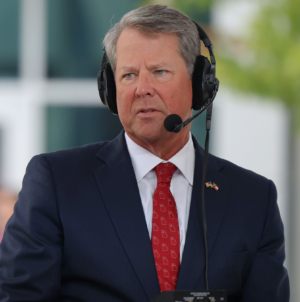-
Brian Kemp Tapped to Head Republican Governors Association - 31 mins ago
-
Netanyahu, Wanted by a Landmark Warrant, Now Faces a Smaller World - 32 mins ago
-
South Pasadena joyride ends in reckless evading for 13-year-old - 44 mins ago
-
Shedeur Sanders Is Not a Top-20 Prospect in 2025, per NFL Draft Expert’s Big Board - about 1 hour ago
-
‘Wicked’ Review: Cynthia Erivo and Ariana Grande in Oz - about 1 hour ago
-
Human skull and bones wash ashore in Palos Verdes Estates - about 1 hour ago
-
80-Year-Old Grandma Sends Engagement Card, Not Realizing What It Says - 2 hours ago
-
What Forecasters Say the Powerful Storm on the West Coast Will Do Next - 2 hours ago
-
Can deputies be forced to show investigators their tattoos? Not yet, says appeals court - 2 hours ago
-
Macy’s Thanksgiving Day Parade 2024: How to Watch and Who’s Performing - 2 hours ago
‘Still No FEMA, Still No Military’: Volunteers Blast Helene Response on CNN
During a CNN interview on Sunday afternoon, volunteer pilots and relief organizers criticized the federal government’s response to Hurricane Helene, saying there’s “still no FEMA [Federal Emergency Management Agency], still no military” in North Carolina, which was ravaged by the storm late last month.
Hurricane Helene made landfall on Florida’s Big Bend region on September 26 as a Category 4 hurricane and then tore through the Southeast region of the United States. It hit parts of Western North Carolina particularly hard, washing away roads, destroying homes, and leaving millions without power.
According to the Associated Press, 227 people have died across six states as a result of the storm, with the number expected to rise as relief efforts continue, making it the deadliest hurricane to hit the U.S. mainland since Hurricane Katrina in 2005.
On Sunday, directors of two major volunteer relief groups, Operation Airdrop and Operation Helo, somberly described the realities on the ground to CNN host Omar Jimenez.
Operation Airdrop chairman Doug Jackson struggled to explain the destruction he saw in the region, “Their homes are gone. What they have around them is all they have left in this world. It’s absolutely devastating for them. It’s hard to describe, never seen anything like it.”
The volunteer group uses planes and pilots to deliver life-saving supplies to people in need in more remote and inaccessible locations. Jackson said the operation “had flown 673 flights, delivered over 400,000 pounds by air, and 700,000 pounds by truck, for a total of almost 1.2 million pounds of supplies out of one airport.”
Limited by fixed-wing planes at the Concord-Padgett airport outside of Charlotte, North Carolina, Jackson said he spoke with his friend Matt McSwain, who quickly co-founded Operation Helo to deploy helicopters to hard-to-reach areas. Operation Helo is based out of Hickory Regional Airport in Western North Carolina.
McSwain said Operation Helo has “forged over 400 LZs [helicopter landing zones] over the mountains into the remote locations,” adding that the operation is “flying over 400 missions per day, we have over 90 helicopters registered.”
During the interview, McSwain called out the federal government, explaining that when the operation began, “there was no military presence, there was no military help, there was no FEMA, there was no nothing.”
He continued that today, nearly a week-and-a-half after the hurricane hit, there’s “still no FEMA, still no military, still no nothing, we’re begging—this is day eight, nine now.”
Newsweek has reached out to FEMA for comment via email on Sunday afternoon.

Mario Tama/Getty Images
“We’re tired,” he added. “But if we go home, mama and papa won’t get their medicine, and they die. So that’s why were still forging on.”
McSwain continued: “We’re doing the best we can to keep these people alive,” pleading that the volunteer groups “need the military here, we want to go home, we want to turn this over to an operation, we want some help, we need some help, I don’t know what else to do to get it.”
Behind McSwain was a map with various nodes showing the location of helicopters, landing zones, and the region’s topography. Pointing to the map, he said, “We are integrated with the military, they are watching what we’re doing, but for some reason, they won’t show up.”
On Sunday afternoon, Pentagon press secretary Major General Pat Ryder said nearly 1,000 soldiers “have been mobilized to support the residents and affected counties devastated by Hurricane Helene in Western North Carolina. These soldiers are closely working with FEMA to provide commodity distribution to local jurisdictions designated by FEMA, in close coordination with North Carolina officials.”
The federal government’s response to Helene has come under scrutiny by many, including political opponents and supporters, who say the disaster relief organization isn’t doing enough to support Americans in need.
On Wednesday, Vice President Kamala Harris, the Democratic presidential nominee, announced that FEMA workers were going door-to-door in affected areas to provide residents with immediate relief money worth $750. The $750 is part of a larger effort to provide aid to those impacted by the hurricane.
“FEMA is also providing tens of thousands more dollars for folks to help them be able to deal with home repair, to be able to cover a deductible when and if they have insurance, and also hotel costs,” Harris said at the time.
Scrutiny about FEMA spending has increased in recent weeks after FEMA spent money on assisting communities across the country dealing with an influx of migrants through its Shelter and Services Program (SSP). The program had a budget of $640 million for the 2024 Fiscal Year, which ended on September 30.
Former President Donald Trump, the GOP’s presidential nominee, has criticized the SSP, which helps local governments and nonprofits support migrants. However, FEMA and the Department of Homeland Security (DHS) have denied that any FEMA disaster relief funds have gone to the program.
“The Shelter and Services Program (SSP) is a completely separate, appropriated grant program that was authorized and funded by Congress and is not associated in any way with FEMA’s disaster-related authorities or funding streams,” a DHS spokesperson previously told Newsweek.
Claims have been surfacing that FEMA doesn’t have enough money to assist those in need after Helene, however FEMA has publicly rebuked these rumors, writing on its website, “FEMA’s Disaster Relief Fund has enough funding to support Hurricane Helene efforts and FEMA has what it needs for immediate response and recovery efforts.”
Homeland Security Secretary Alejandro Mayorkas told reporters Wednesday that while the agency can address immediate needs, “FEMA does not have the funds to make it through the season.”
Source link


















